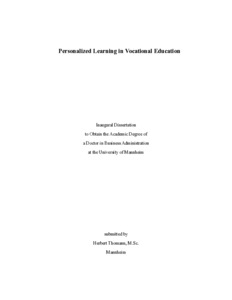|
Personalized learning in vocational education
Thomann, Herbert
![[img]](https://madoc.bib.uni-mannheim.de/69976/1.hassmallThumbnailVersion/Dissertation_Herbert%20Thomann.pdf)  Vorschau |
|
PDF
Dissertation_Herbert Thomann.pdf
- Veröffentlichte Version
Download (12MB)
|
|
URN:
|
urn:nbn:de:bsz:180-madoc-699763
|
|
Dokumenttyp:
|
Dissertation
|
|
Erscheinungsjahr:
|
2025
|
|
Ort der Veröffentlichung:
|
Mannheim
|
|
Hochschule:
|
Universität Mannheim
|
|
Gutachter:
|
Deutscher, Viola
|
|
Datum der mündl. Prüfung:
|
2025
|
|
Sprache der Veröffentlichung:
|
Englisch
|
|
Einrichtung:
|
Fakultät für Betriebswirtschaftslehre > Wirtschaftspädagogik, Kompetenzentwicklung und Ausbildungsqualität (Deutscher 2016-2024)
|
|
Fachgebiet:
|
370 Erziehung, Schul- und Bildungswesen
|
|
Freie Schlagwörter (Englisch):
|
business education , digitalization , economic education , EdTech , learning and instructional technology , personalized learning , vocational education and training , VET , thesis
|
|
Abstract:
|
Personalized learning (PL) has become increasingly relevant in Vocational Education and Training (VET) due to changing workplace demands, the increasing heterogeneity of learner characteristics, and new opportunities presented by digital learning systems. Digital personalized learning (DPL) environments adapt to individual needs and provide targeted support through digital tools, promoting knowledge acquisition. Against this background, VET has undergone significant digital transformation, leading to the development of various personalized learning approaches. This dissertation examines the effectiveness of DPL approaches in VET through three interconnected studies. The first study presents a meta-analysis of 68 experimental studies on personalized digital learning prompts. It reveals that while prompts have a moderate positive effect on learning achievement (d = .394), publication bias analysis suggests a more conservative estimate (d = .22). Action-based prompts (d = .447) and group-targeted prompts (d = .513) significantly enhance learning achievement compared to standardized interventions. The second study's design-based research investigates the development and implementation of a personalized prompt design in the Luca Office Simulation. It demonstrates how cognitive, metacognitive, and non-cognitive prompts can be tailored to support individual learning processes based on log data in vocational business education. The third study evaluates personalization through immersive virtual reality (IVR) in VET using a randomized controlled trial with 72 students. Although IVR improved motivation, mood, and immersion, traditional methods were found to be more effective for immediate declarative knowledge acquisition. This highlights a significant discrepancy between perceived and actual learning gains. While revealing certain limitations in digital approaches, these findings suggest that successful personalization requires careful consideration of learning objectives, student characteristics, and design principles, while emphasizing the importance of balanced implementation approaches that combine traditional and digital learning methods. This research contributes to understanding how digital technologies can effectively support personalized learning in vocational education while acknowledging both their potential and limitations.
|
 | Dieser Eintrag ist Teil der Universitätsbibliographie. |
 | Das Dokument wird vom Publikationsserver der Universitätsbibliothek Mannheim bereitgestellt. |
 Suche Autoren in Suche Autoren in
Sie haben einen Fehler gefunden? Teilen Sie uns Ihren Korrekturwunsch bitte hier mit: E-Mail
Actions (login required)
 |
Eintrag anzeigen |
|
|
